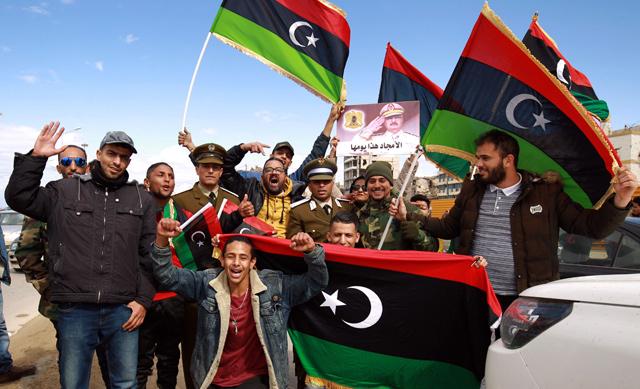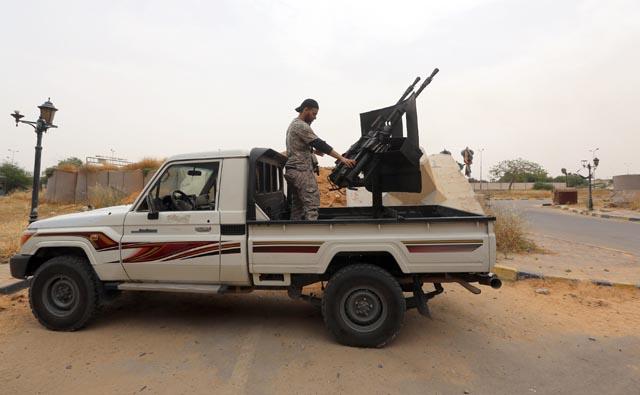You are here
Libyans remember revolution that ousted Qadhafi but brought chaos
By AFP - Feb 17,2021 - Last updated at Feb 17,2021

Libyans wave national flags as they gather to mark the 10th anniversary of the 2011 revolution, in the eastern city of Benghazi, on Wednesday (AFP photo)
TRIPOLI — Libyans marked 10 years on Wednesday since the start of the uprising that toppled longtime ruler Muammar Qadhafi, ending a long-lived dictatorship but throwing the country into a decade of violent lawlessness.
In western Libya, festive crowds gathered in public squares to watch anniversary fireworks, military parades and speeches.
In the east, ruled by a rival authority bitterly opposed to the armed groups dominating the west, the mood was more sombre.
Residents of Zawiya, near the capital Tripoli in the west, marched on the city centre where dozens of rebel fighters were executed in 2011 after being surrounded by Qadhafi’s forces.
Flags hung from buildings still bearing the scars of mortar and small arms fire.
Those marks “will stay, so we don’t forget what happened here”, said Mofida Al Romeih, who lost two brothers and a cousin in the massacre.
The commemorations came as the UN steps up efforts for a peaceful resolution to the bitter conflict that has divided the country since Qadhafi’s ouster and killing in the NATO-backed uprising.
UN envoy Jan Kubis met Libyan leaders on Tuesday on his first visit to the North African nation since taking up the post.
He stressed the importance of consolidating a fragile October ceasefire between the country’s warring alliances in the east and west, a UN statement said.
He also called for a “smooth transition of power” following talks in Switzerland which resulted in the formation of a new, unified interim executive authority earlier this month.
UN chief Antonio Guterres, in phone calls with Libya’s newly appointed leaders on Tuesday, called for all foreign troops and mercenaries to leave, his spokesman said.
Turkey, Russia and the United Arab Emirates are all backing parties to Libya’s conflict with manpower and arms, exacerbating the country’s divisions in the wake of Qadhafi’s demise.
While the streets of western Libyan cities were decked out with lights and banners, commemorations were low-key in the east, where an administration backed by military strongman Khalifa Haftar holds sway.
Even in the region’s main city Benghazi — where the revolution began 10 years ago — no official events were planned despite authorities declaring Wednesday a national holiday.
“Going out to celebrate... would be mad because the revolution has been a catastrophe that has wrecked years of stability,” said Khamis Al Sahati, an eastern-based activist.
‘Mad’ to celebrate
It was the defeat of a drive on Tripoli by Haftar’s forces in June last year that led to the progress in UN-backed talks on a settlement.
Meanwhile much of Libya remains in the hands of a mosaic of neighbourhood militias born out of the rebel groups that toppled Qadhafi.
Some stand accused of war crimes that have gone unpunished because of the militias’ importance to the rival alliances in power in Tripoli and Benghazi.
“Justice has yet to be delivered to victims of war crimes and serious human rights violations including unlawful killings, enforced disappearances, torture, forced displacement and abductions committed by militias and armed groups,” human rights group Amnesty International said in a statement.
On the international level, many of the foreign forces whose intervention helped fuel the conflict of recent years remain in Libya.
During the battle for Tripoli in 2019-2020, Haftar received military support from Russia, the UAE and Egypt, while the rival Government of National Accord received crucial backing from Turkey.
“The secretary general stressed the UN’s support to Libya’s elections, the monitoring of the ceasefire and the need for withdrawal of foreign forces,” UN spokesman Stephane Dujarric said.
In December, there were around 20,000 foreign troops and mercenaries deployed inside Libya, according to the UN.
Asked if the world body had noticed any start of a withdrawal of foreign forces, Dujarric said the UN was not aware of any pullout.
“We want that to happen, obviously as soon as possible,” he said.
Related Articles
BENGHAZI, Libya — Libya’s eastern commander Khalifa Haftar said on Wednesday his forces had taken full control of Libya’s second city Bengha
The top commander of the Libyan army’s special forces said on Monday his troops had joined forces with renegade general Khalifa Haftar, who has said he wants to purge the North African country of militant Islamists, Reuters reported.
A renegade general leading a military offensive against Islamists and their allied militias dominating Libya’s political scene on Saturday welcomed street rallies in support of his campaign, saying the demonstrations have given him a “mandate” to fight terrorism.

















